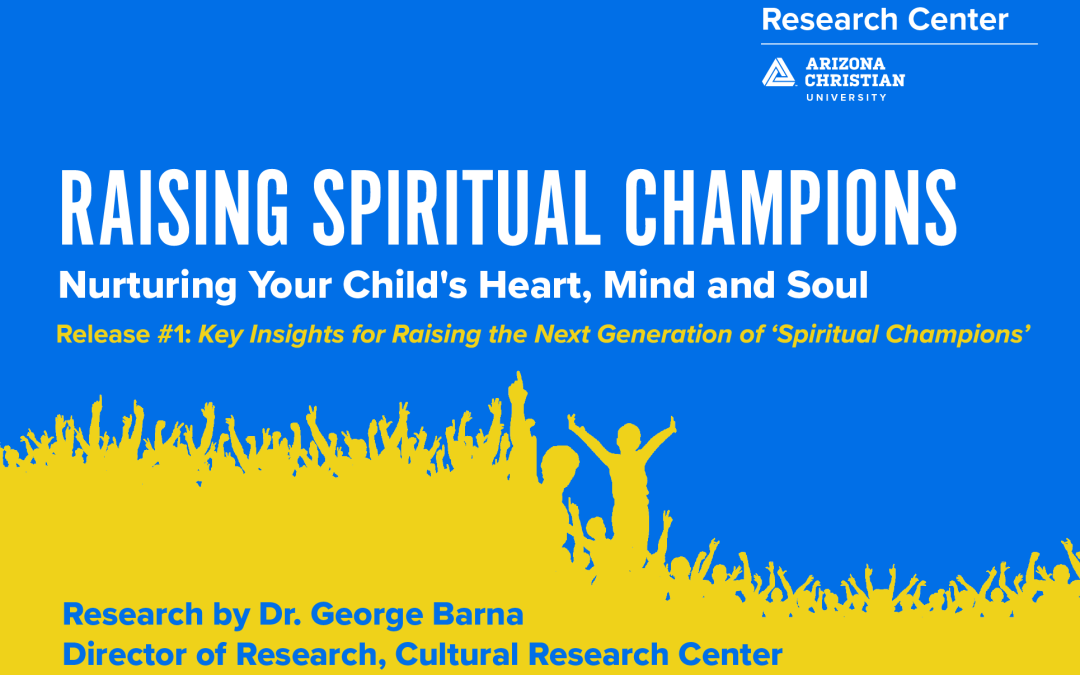Tracy F. Munsil, Ph.D | September 6, 2023
From the Cultural Research Center at Arizona Christian University
GLENDALE, AZ — Very few of today’s parents, who have the primary responsibility to disciple their children, even have that task on their radar, according to new research from veteran researcher and author Dr. George Barna.
The research, conducted by the Cultural Research Center at Arizona Christian University, evaluated the spiritual landscape of today’s children and their parents, finding that more than 90% of parents have no plan for their children’s spiritual development.
Instead, an overwhelming majority of parents are delegating worldview development to purported “experts”—with increasingly dismal results.
The research was conducted over more than two years and is presented in Dr. Barna’s Amazon bestselling new book, Raising Spiritual Champions: Nurturing Your Child’s Heart, Mind and Soul (Arizona Christian University Press, 2023, with Fedd Books).
Arizona Christian University President Len Munsil said the book is “required reading” for today’s parents, grandparents, and others who are in a position to influence the education and spiritual development of children.
“The insights revealed in Raising Spiritual Champions are truly shocking,” Munsil said. “We face the very real possibility that the next generation of children will become adults completely without any of the biblical foundations that lead to joy, peace, success, and human flourishing.”
“I agree with Dr. Barna’s conclusion that we need to transform how we raise our children—and that time is of the essence for us to make this change,” Munsil said.
Among the key findings explored by Barna in Raising Spiritual Champions:
A person’s worldview begins developing in the second year of life (from 15 to 18 months) and is largely in place by the age of 13. That’s the prime window of opportunity for discipleship.
According to Barna, worldview development must be a strategic focus of today’s parents from the very beginning of their child’s life. As he explained in a research report released today, adults typically reach the end of their lives with the same worldview they had at age 13. On average, they do not change unless they encounter a major crisis or experience spiritual conversion.
Childhood, Barna says, is when critical decisions are made about every dimension of life, including the spiritual.
“As children grow up, they start asking fundamental questions– ‘How does life work? What matters? Who am I? Why am I here?’” Barna explained. “And the research shows that once they answer these questions during these early years, they retain these answers for the rest of their lives, and they build on those as foundation stones.”
Despite this fact, very few parents have the spiritual development of their children on their radar screen.
In fact, Barna’s research shows that fewer than 10% have any kind of spiritual development plan for their children. Less than six out of 10 born-again Christians overall (58%) even claim to be the ones primarily responsible for the development of their children.
The research further suggests that most parents, even born-again parents, do not really think the spiritual component of their child’s life is all that important—at least not as important as doing well in school, sports, or relationships. And even if they are focused on building their child’s biblical worldview, very few parents today—only 2%—possess a biblical worldview themselves.
This has created a gaping spiritual vacuum, since as Barna says, parents can’t give what they don’t have. It has also contributed to a troubling new trend explored in depth in Raising Spiritual Champions—outsourcing.
“Outsourcing” is a trend that sees parents increasingly delegating key child-rearing tasks to others.
The research paints a picture, Barna says, of parents who are winging it. They love their kids, but often feel inadequate or unable to give them what they need. The result is that these parents are increasingly reliant on perceived “experts” to whom they delegate their children’s spiritual development.
In the process, parents are allowing those “experts”—who may or may not share their faith and values—to shape the worldview that their children will likely carry throughout their lives. Even if these “experts” are in professional ministry, as other recent research from Barna has indicated, there is a sharply decreasing possibility that even they possess a biblical worldview.
Not surprisingly, another key finding the book unpacks is that the approaches today’s parents are taking in their children’s spiritual development are not working.
In fact, one of the most troubling findings of the Raising Spiritual Champions research is that only 1% of preteen children possess a biblical worldview. And this leads to distortions and deficiencies in other areas of worldview understanding.
According to Barna, it was numbers and trends like these that convinced him of the desperate need for today’s parents to have a research-supported, Bible-based resource to help them successfully raise their children to become spiritually mature adults.
“What became abundantly clear during my research is there is little objective information about conditions related to the faith, discipleship, and worldview of children,” he said. “And parents desperately need resources and support to help them in the spiritual development of their children. The nation has clearly been going in the wrong direction for decades when it comes to worldview.”
These topics, as well as information about how to turn the tide, are explored in more depth in “Key Insights for Raising the Next Generation of ‘Spiritual Champions,’” the first of five research releases from Raising Spiritual Champions.
Released on Sept. 5, Raising Spiritual Champions: Nurturing Your Child’s Heart, Mind and Soul (Arizona Christian University Press in partnership with Fedd Books) is an Amazon Best Seller in Christian Social Sciences and also a #1 New Release in Parenting.

